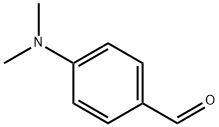4-Ethylbenzaldehyde
- CAS NO.:4748-78-1
- Empirical Formula: C9H10O
- Molecular Weight: 134.18
- MDL number: MFCD00006956
- EINECS: 225-268-8
- SAFETY DATA SHEET (SDS)
- Update Date: 2024-12-18 14:08:52

What is 4-Ethylbenzaldehyde?
Chemical properties
CLEAR COLOURLESS TO SLIGHTLY YELLOW LIQUID
Chemical properties
4-Ethylbenzaldehyde has a sweet, bitter-almond odor
Occurrence
Reported found in roasted turkey, grilled and roasted beef, roasted chicken, cider, black tea, roasted peanuts and cooked trassi
The Uses of 4-Ethylbenzaldehyde
4-Ethylbenzaldehyde has been used in the synthesis of 4,4′-diaminotriphenylmethanes under microwave irradiation, which is useful for parallel library syntheses.
The Uses of 4-Ethylbenzaldehyde
It is used as a perfuming agent in cosmetics industry. It is also used as a pharmaceutical intermediate.
Definition
ChEBI: 4-Ethylbenzaldehyde is a carbonyl compound.
Aroma threshold values
Detection: 13 ppb; recognition: 40 ppb
Synthesis Reference(s)
Synthetic Communications, 26, p. 315, 1996 DOI: 10.1080/00397919608003620
General Description
4-Ethylbenzaldehyde is a by-product of disinfection. Kinetic constants (KI) of 4-ethylbenzaldehyde for inhibition of the diphenolase activity of mushroom tyrosinase has been investigated.
Properties of 4-Ethylbenzaldehyde
| Boiling point: | 221 °C (lit.) |
| Density | 0.979 g/mL at 25 °C (lit.) |
| vapor pressure | 16.67Pa at 25℃ |
| FEMA | 3756 | 4-ETHYLBENZALDEHYDE |
| refractive index | n |
| Flash point: | 198 °F |
| storage temp. | 4°C, stored under nitroge |
| form | Liquid |
| color | Clear colorless to light yellow |
| Odor | at 10.00 % in dipropylene glycol. bitter almond sweet anise |
| Water Solubility | Not miscible or difficult to mix in water. Soluble in alcohol. |
| Sensitive | Air Sensitive |
| JECFA Number | 865 |
| BRN | 636027 |
| CAS DataBase Reference | 4748-78-1(CAS DataBase Reference) |
| NIST Chemistry Reference | Benzaldehyde, 4-ethyl-(4748-78-1) |
| EPA Substance Registry System | Benzaldehyde, 4-ethyl- (4748-78-1) |
Safety information for 4-Ethylbenzaldehyde
| Signal word | Warning |
| Pictogram(s) |
 Exclamation Mark Irritant GHS07 |
| GHS Hazard Statements |
H227:Flammable liquids H315:Skin corrosion/irritation H319:Serious eye damage/eye irritation |
| Precautionary Statement Codes |
P210:Keep away from heat/sparks/open flames/hot surfaces. — No smoking. P280:Wear protective gloves/protective clothing/eye protection/face protection. P305+P351+P338:IF IN EYES: Rinse cautiously with water for several minutes. Remove contact lenses, if present and easy to do. Continuerinsing. P370+P378:In case of fire: Use … for extinction. P403+P235:Store in a well-ventilated place. Keep cool. P501:Dispose of contents/container to..… |
Computed Descriptors for 4-Ethylbenzaldehyde
| InChIKey | QNGNSVIICDLXHT-UHFFFAOYSA-N |
New Products
Tert-butyl bis(2-chloroethyl)carbamate (S)-3-Aminobutanenitrile hydrochloride N-Boc-D-alaninol N-BOC-D/L-ALANINOL N-octanoyl benzotriazole 4-Hydrazinobenzoic acid 3,4-Dibenzyloxybenzaldehyde Electrolytic Iron Powder 1,1’-CARBONYLDIIMIDAZOLE R-2-BENZYLOXY PROPIONIC ACID 4-HYDROXY BENZYL ALCOHOL 1,1’-CARBONYLDI (1,2-4 TRIAZOLE) S-2-CHLORO PROPIONIC ACID (2-Hydroxyphenyl)acetonitrile 4-Bromopyrazole 5-BROMO-2CYANO PYRIDINE 5,6-Dimethoxyindanone 5-broMo-2-chloro-N-cyclopentylpyriMidin-4-aMine 3-(Hydroxymethyl)benzoate N-Boc-2-chloroethylamine 1-Bromo-2-methoxy-3-nitrobenzene N-Methyl-3-cyclopenten-1-amine 2-Bromo-3-hydroxybenzaldehyde 1H-indazole-5-carboxamideRelated products of tetrahydrofuran








You may like
-
 4-Ethylbenzaldehyde CAS 4748-78-1View Details
4-Ethylbenzaldehyde CAS 4748-78-1View Details
4748-78-1 -
 4-Ethylbenzaldehyde CAS 4748-78-1View Details
4-Ethylbenzaldehyde CAS 4748-78-1View Details
4748-78-1 -
 7441-43-2 98%View Details
7441-43-2 98%View Details
7441-43-2 -
 1260741-78-3 6-Bromo-3-iodo-1-methyl-1H-indazole 98%View Details
1260741-78-3 6-Bromo-3-iodo-1-methyl-1H-indazole 98%View Details
1260741-78-3 -
 4-bromo-3,5-dimethylbenzenesulfonyl chloride 1581266-79-6 98%View Details
4-bromo-3,5-dimethylbenzenesulfonyl chloride 1581266-79-6 98%View Details
1581266-79-6 -
 2490430-37-8 98%View Details
2490430-37-8 98%View Details
2490430-37-8 -
 N-(5-Amino-2-methylphenyl)acetamide 5434-30-0 98%View Details
N-(5-Amino-2-methylphenyl)acetamide 5434-30-0 98%View Details
5434-30-0 -
 124371-59-1 98%View Details
124371-59-1 98%View Details
124371-59-1